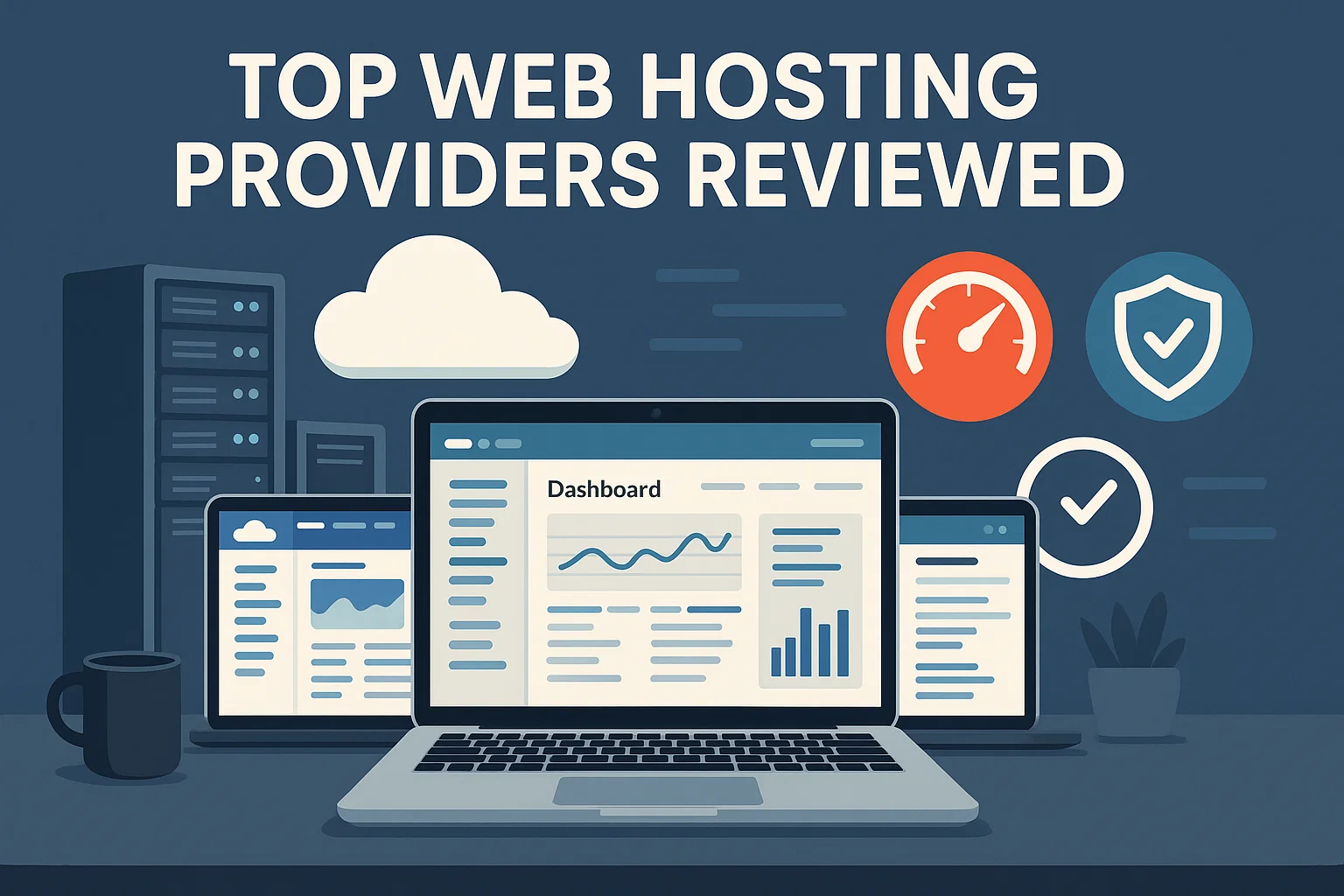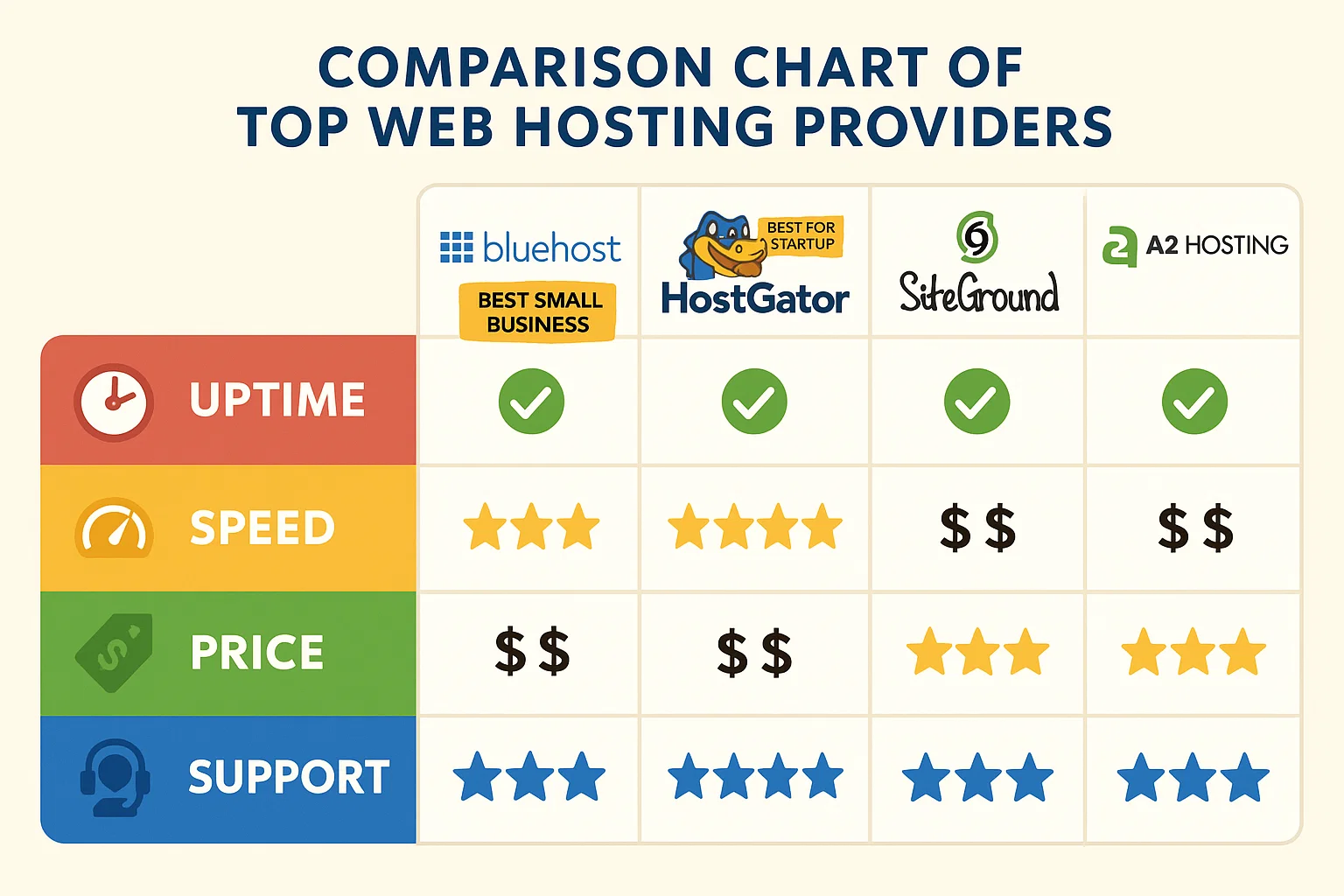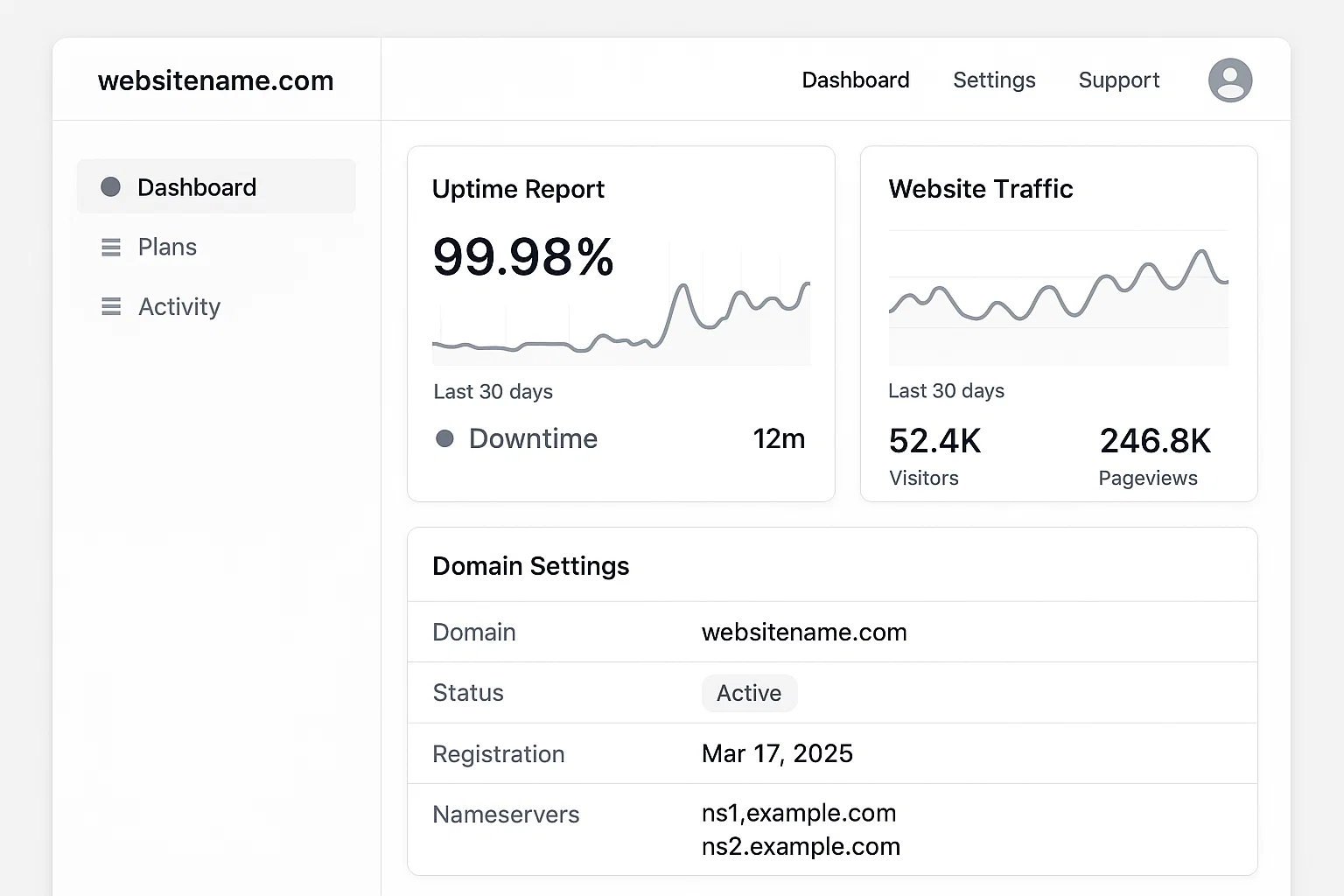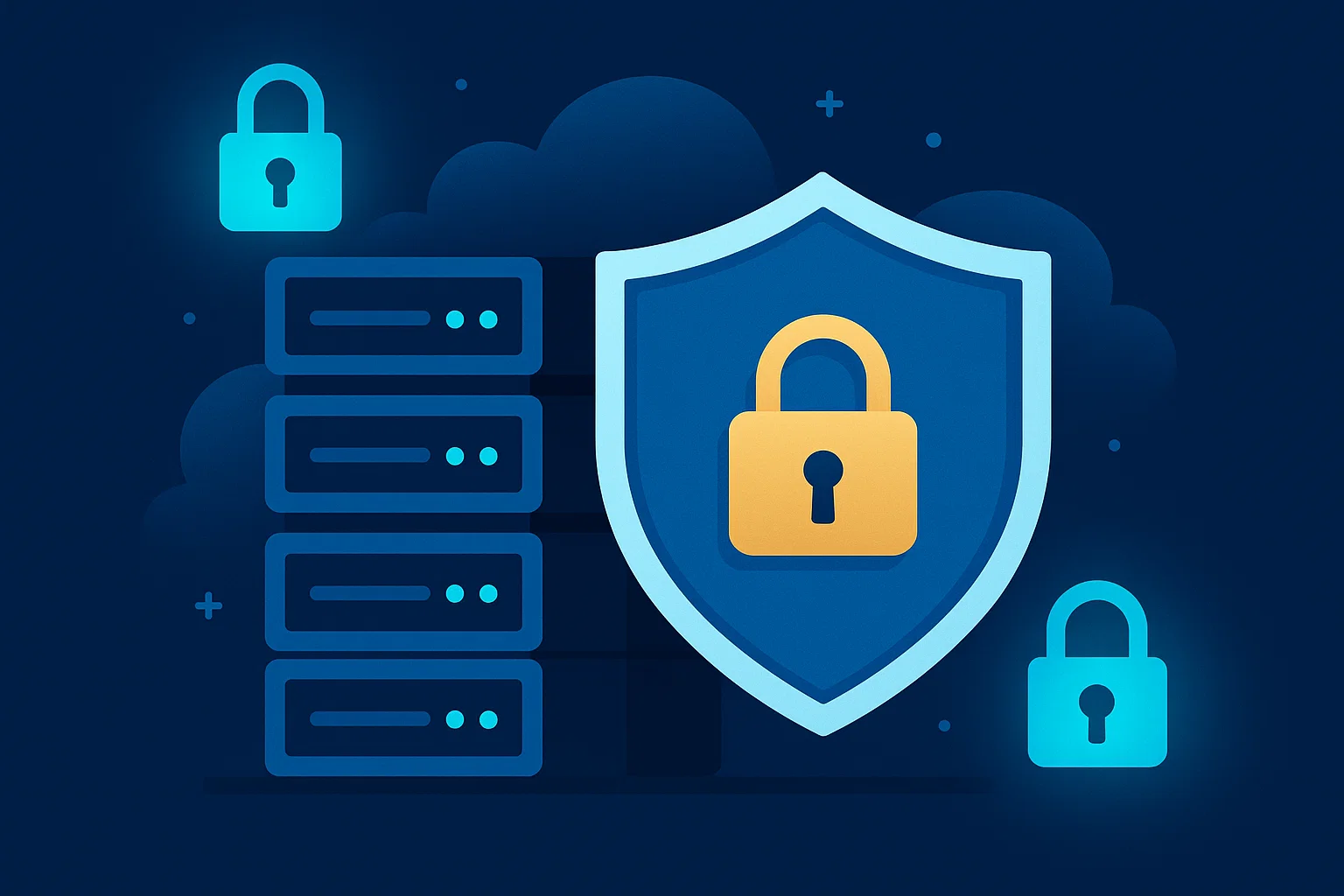
Why Web Hosting Matters in 2025
Every website you visit today runs on a web hosting provider. It’s the invisible foundation that keeps a site live, loads it quickly, and protects your data. In 2025, the demand for reliable hosting is higher than ever. According to Statista, there are now over 1.1 billion websites worldwide, and about 71% of small businesses in the U.S. alone have an online presence. That number is still growing as startups and entrepreneurs realize that a fast, secure website is no longer optional.
Hosting directly impacts everything:
Speed – A slow host means slow pages, and Google research shows that if a page takes longer than 3 seconds to load, over 50% of users leave.
Security – Without SSL, backups, and firewalls, your business data is at risk.
SEO & Sales – Downtime or lagging performance can kill your search ranking and frustrate paying customers.
In short, choosing the wrong host can cost more than just money it can cost credibility. That’s why reviewing the top web hosting providers matters today more than ever.
Common Problems with Cheap or Bad Hosting
Not all hosting is equal. Many site owners start with cheap hosting packages and regret it later when traffic grows. Here are the most common issues:
| Problem | Cause | Impact |
|---|---|---|
| Downtime | Overloaded shared servers | Lost sales, frustrated visitors |
| Slow speed | Poor server optimization | Lower SEO ranking, bad user experience |
| Hidden costs | Low entry price but high renewal rates | Budget strain, unexpected expenses |
| Weak security | No firewalls or regular backups | Risk of hacks, data breaches |
| Poor support | Outsourced or untrained help | Delays in fixing urgent issues |
Real-world case: A small e-commerce startup I consulted in New Jersey chose a “$1/month” host. Within three months, their site was offline during peak shopping hours twice. Each outage cost them an estimated $800 in lost sales. Cheap isn’t always smart.
Criteria for Reviewing Hosting Providers
When reviewing providers for this guide, I looked at what matters most for small businesses, students, and startups.
Speed and Uptime – Hosts should guarantee at least 99.9% uptime and deliver pages in under 500ms load time.
Security Features – SSL certificates, DDoS protection, regular backups, and firewalls should come included.
Pricing and Value – Entry prices matter, but renewal rates and hidden fees matter more.
Customer Support – 24/7 live chat or phone with knowledgeable staff is essential.
Scalability – Ability to upgrade from shared hosting to VPS or cloud without downtime.
Ease of Use – Control panel simplicity, website builders, and integration with WordPress or Shopify.
These criteria shaped the list of top hosting providers we’ll review below.

Best Web Hosting for Small Business
Small business owners need hosting that balances cost with reliability. A florist, café, or local repair shop doesn’t need enterprise-level hosting but can’t afford downtime.
Example: A café owner in Chicago built a simple online ordering website. Their site only gets a few thousand visitors monthly, but every second matters when customers place lunch orders. They needed an affordable host with SSL, backups, and easy support.

Top Picks for Small Businesses:
Bluehost – Known for simplicity and WordPress integration.
Pros: 24/7 support, free domain for 1 year, SSL included.
Cons: Higher renewal fees after the first term.
HostGator – Flexible plans, reliable uptime, and scalable for growth.
Pros: Easy to upgrade to VPS, great uptime history.
Cons: Interface feels a bit dated compared to newer hosts.
SiteGround – Recommended by WordPress.org, strong on speed and support.
Pros: Excellent support team, strong caching system.
Cons: Slightly pricier for beginners.
Best Web Hosting for Startups
Startups often begin with limited budgets but need hosting that can grow quickly. Scalability is key.
Example: A fintech startup in Austin launched with 200 daily visitors but scaled to 20,000 in less than a year. Their cloud-based host automatically adjusted resources without downtime, keeping customers happy.
Top Picks for Startups:
Cloudways – Flexible, managed cloud hosting with pay-as-you-go pricing.
Pros: Scalable resources, advanced developer tools.
Cons: Requires some tech knowledge.
Hostinger – Budget-friendly with surprisingly fast servers.
Pros: Cheapest reliable option, simple dashboard.
Cons: Limited support compared to premium hosts.
DreamHost – Transparent pricing and unlimited bandwidth.
Pros: No hidden costs, strong uptime guarantee.
Cons: Not the fastest in benchmarks.

US Web Hosting Companies Leading the Market
The U.S. still dominates the hosting industry, with providers like Bluehost, HostGator, and InMotion leading the pack.
Case Study: In 2024, a study by W3Techs showed that over 40% of small businesses in the U.S. use a U.S.-based hosting provider due to better support and compliance with local regulations.
Expert Quote:
“Choosing a hosting provider based in your target market often improves latency and legal compliance. For U.S. businesses, a U.S. host can mean faster load times and easier support.” Gartner Research (2024)
Best Website Builders with Hosting
Not everyone wants to code. Website builders with hosting included are a growing trend.
Wix – Drag-and-drop builder, hosting included. Great for beginners.
Squarespace – Known for design-focused templates. Popular with artists and photographers.
WordPress.com – Easy to set up, with built-in hosting.
Pros of all-in-one builders:
No separate hosting setup.
Templates and drag-drop editors.
Integrated SSL and domains.
Cons:
Limited flexibility compared to WordPress.org + independent hosting.
Cheap Web Hosting Options (But Reliable)
Cheap doesn’t always mean bad. Some providers offer excellent starter plans under $5/month.
| Provider | Starting Price | Renewal Price | Features |
|---|---|---|---|
| Hostinger | $2.99/month | $4.99/month | Free SSL, fast servers |
| Namecheap | $1.98/month | $3.98/month | Domain + hosting combo |
| iPage | $1.99/month | $7.99/month | Unlimited storage/bandwidth |
Real example: A student blogger in California launched her first WordPress blog with Hostinger. For under $40 a year, she had a live site that loaded under 1 second.
Secure and Domain Hosting Providers
When hosting and domains come from the same provider, it simplifies management. Privacy and security are key.
Namecheap – Affordable domains with WHOIS privacy.
GoDaddy – Bundled hosting + domains, but higher renewal fees.
Google Domains + Hosting (partnered with Wix/Shopify) – Easy integration for beginners.

Why it matters: Data breaches are on the rise. A report by Symantec found that 43% of cyberattacks target small businesses. Choosing a secure host with SSL and backups is no longer optional.
Advanced Hosting Solutions for 2025
For growing businesses and developers, shared hosting won’t cut it. Advanced options:
VPS Hosting – Virtual servers for more control.
Dedicated Hosting – Entire server for one client.
Cloud Hosting – Flexible, scalable, pay-as-you-go.
Edge Hosting – Hosting closer to users for speed.
Green Data Centers – Eco-friendly hosting powered by renewable energy.
Future Insight: Cisco predicts that by 2030, over 70% of hosting providers will use AI for auto-scaling and diagnostics, reducing downtime even further.
Expert Insights and Predictions
Cisco: AI-driven hosting will dominate by the late 2020s.
IEEE: Latency improvements will push edge hosting as a standard.
Gartner: Hosting costs will rise, but so will reliability and eco-friendliness.
Step-by-Step Guide: How to Choose the Right Host
Define your traffic and storage needs.
Compare entry vs. renewal pricing.
Look for 99.9% uptime guarantees.
Choose providers with free SSL and backups.
Test support response before committing.
Check real customer reviews.
Practical Checklist Before Buying Hosting
✅ At least 99.9% uptime SLA
✅ SSL certificate included
✅ Transparent renewal pricing
✅ Daily or weekly backups
✅ 24/7 support with live chat
Resources for Further Reading
Final Thoughts Before You Choose Your Host
Your hosting provider is the backbone of your online presence. Whether you run a café website, a startup app, or a personal blog, the right host ensures your site is fast, secure, and always available.
Don’t just look at price look at uptime, support, and scalability. Start small if you must, but choose a provider that can grow with you. And whenever possible, test hosting with a trial before committing long-term.
Your website deserves a strong home. Choose wisely.
